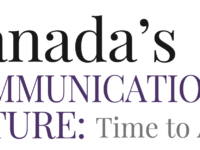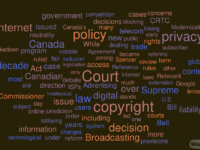Prime Minister Justin Trudeau recently claimed that “we’ve cut the cost of cell phone plans in half since 2019 – in part by increasing competition.” Is that true? What is the real state of Canadian wireless competition and how does pricing compare with other countries? To help answer those questions, this week David Soberman, a Professor of Marketing at the Rotman School of Management at the University of Toronto and the Canadian National Chair of Strategic Marketing joins the Law Bytes podcast. Professor Soberman’s research is focused on understanding how the operation of markets is affected by the exchange of information between organizations and customers, relationships within the distribution channel and the introduction of innovations to markets.
Post Tagged with: "internet"
Why the Liberals Have Become the Most Anti-Internet Government in Canadian History
The Liberals led by Prime Minister Justin Trudeau were first elected in 2015 on a platform that emphasized transparency, consultation, and innovation. The signals were everywhere: it released ministerial mandate letters to demonstrate transparency, renamed the Minister of Industry to the Minister of Innovation, Science and Economic Development to point to the importance of an innovative economy, and soon after the cabinet was sworn in, Canadians were awash in public consultations (I recall participating in an almost instant consult on the Trans Pacific Partnership). With promises of entrenching net neutrality, prioritizing innovation, focusing on privacy rather than surveillance, and supporting freedom of expression, the government left little doubt about its preferred policy approach.
As I watched Canadian Heritage Minister Steven Guilbeault yesterday close the Action Summit to Combat Online Hate, I was left with whiplash as I thought back to those early days. Today’s Liberal government is unrecognizable by comparison as it today stands the most anti-Internet government in Canadian history:
- As it moves to create the Great Canadian Internet Firewall, net neutrality is out and mandated Internet blocking is in.
- Freedom of expression and due process is out, quick takedowns without independent review and increased liability are in.
- Innovation and new business models are out, CRTC regulation is in.
- Privacy reform is out, Internet taxation is in.
- Prioritizing consumer Internet access and affordability is out, reduced competition through mergers are in.
- And perhaps most troublingly, consultation and transparency are out, secrecy is in.
The LawBytes Podcast, Episode 38: Debating the Broadcast Panel Report – A Conversation with BTLR Panel Chair Janet Yale
The release of the much-anticipated Broadcast and Telecommunications Legislative Review Panel report late last month sparked a torrent of discussion and debate. The 235 page report – often referred to as the BTLR or Yale Report – features 97 recommendations that covers telecom, broadcast, the future of the CBC, online harms, digital taxation, and a myriad of other issues. Janet Yale, the panel chair, joins the podcast this week to talk about the report. Our wide ranging conversation touches on the policy objectives of the panel, the news regulation concerns, net neutrality, consumer costs, and what may lie ahead for communications law reform.
The CRTC Knows Best: Panel Report Recommends Costly Overhaul of Canadian Communications Law to Regulate Internet Sites and Services Worldwide
The Broadcast and Telecommunications Legislative Review Panel released its much anticipated report yesterday with a vision of a highly regulated Internet in which an expanded CRTC (or a renamed Canadian Communications Commission) would aggressively assert its jurisdictional power over Internet sites and services worldwide with the power to levy massive penalties for failure to comply with its regulatory edicts. The recommendations should be rejected by Innovation, Science and Industry Minister Navdeep Bains and Canadian Heritage Minister Steven Guilbeault as both unnecessary to support a thriving cultural sector and inconsistent with a government committed to innovation and freedom of expression.
The Canadian Digital Law Decade: The Ten Most Notable Cases, Laws, and Policy Developments
As the decade nears an end, there have been no shortage of decade in review pieces. This post adds to the list with my take on the most notable Canadian digital cases, legislative initiatives, and policies of the past ten years.
1. The 2012 Copyright Modernization Act
The enactment of the 2012 Copyright Modernization Act in June 2012 brought more than a decade of copyright reform battles to a close and immediately ushered in a new round of debate and lobbying that continues until this day. The reform package was the largest copyright overhaul in years, featuring everything from an expansion of fair dealing (including education as a fair dealing purpose) to protection for non-commercial user generated content to the codification of the notice-and-notice system to legal protection for digital locks. The reforms also legalized longstanding practices such as time shifting, set a cap on liability for non-commercial infringement, and established a new provision to target websites that enable infringement.











